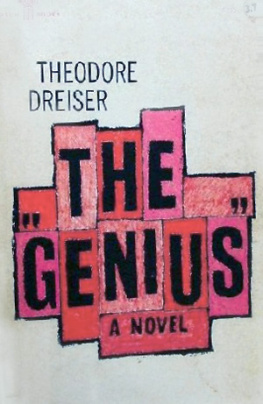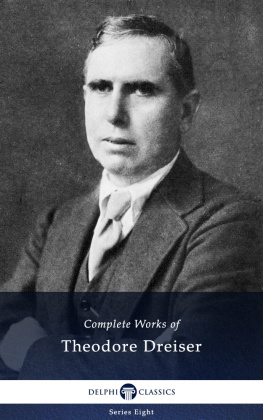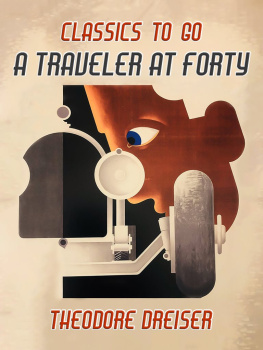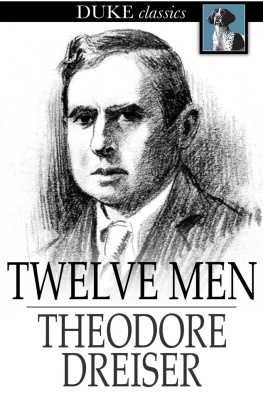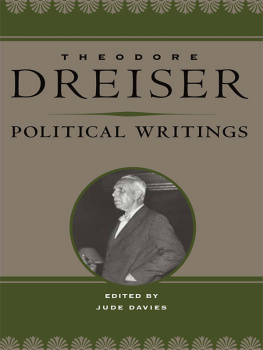Theodore Dreiser - The Genius
Here you can read online Theodore Dreiser - The Genius full text of the book (entire story) in english for free. Download pdf and epub, get meaning, cover and reviews about this ebook. genre: Art / Prose. Description of the work, (preface) as well as reviews are available. Best literature library LitArk.com created for fans of good reading and offers a wide selection of genres:
Romance novel
Science fiction
Adventure
Detective
Science
History
Home and family
Prose
Art
Politics
Computer
Non-fiction
Religion
Business
Children
Humor
Choose a favorite category and find really read worthwhile books. Enjoy immersion in the world of imagination, feel the emotions of the characters or learn something new for yourself, make an fascinating discovery.
- Book:The Genius
- Author:
- Genre:
- Rating:5 / 5
- Favourites:Add to favourites
- Your mark:
- 100
- 1
- 2
- 3
- 4
- 5
The Genius: summary, description and annotation
We offer to read an annotation, description, summary or preface (depends on what the author of the book "The Genius" wrote himself). If you haven't found the necessary information about the book — write in the comments, we will try to find it.
The Genius — read online for free the complete book (whole text) full work
Below is the text of the book, divided by pages. System saving the place of the last page read, allows you to conveniently read the book "The Genius" online for free, without having to search again every time where you left off. Put a bookmark, and you can go to the page where you finished reading at any time.
Font size:
Interval:
Bookmark:


Published: 1915
Categorie(s): Fiction
Source: http://www.gutenberg.org/etext/31824
Theodore Herman Albert Dreiser (August 27, 1871 December 28,1945) was an American novelist and journalist. He pioneered thenaturalist school and is known for portraying characters whosevalue lies not in their moral code, but in their persistenceagainst all obstacles, and literary situations that more closelyresemble studies of nature than tales of choice and agency.
- SisterCarrie (1900)
- Twelve Men(1919)
- JennieGerhardt (1911)
- TheFinancier (1912)
- Titan(1914)
http://www.feedbooks.com
Strictly for personal use, do not use this file for commercialpurposes.
"Eugene Witla, wilt thou have this woman to thy wedded wife, tolive together after God's ordinance in the holy estate ofmatrimony? Wilt thou love her, comfort her, honour her, and keepher in sickness and in health; and forsaking all others, keep theeonly unto her, so long as ye both shall live?"
"I will."
YOUTH
This story has its beginnings in the town of Alexandria,Illinois, between 1884 and 1889, at the time when the place had apopulation of somewhere near ten thousand. There was about it justenough of the air of a city to relieve it of the sense of rurallife. It had one street-car line, a theatre,or rather, an operahouse, so-called (why no one might say, for no opera was everperformed there)two railroads, with their stations, and a businessdistrict, composed of four brisk sides to a public square. In thesquare were the county court-house and four newspapers. These twomorning and two evening papers made the population fairly aware ofthe fact that life was full of issues, local and national, and thatthere were many interesting and varied things to do. On the edge oftown, several lakes and a pretty streamperhaps Alexandria's mostpleasant featuregave it an atmosphere not unakin to that of amoderate-priced summer resort. Architecturally the town was notnew. It was mostly built of wood, as all American towns were atthis time, but laid out prettily in some sections, with houses thatsat back in great yards, far from the streets, with flower beds,brick walks, and green trees as concomitants of a comfortable homelife. Alexandria was a city of young Americans. Its spirit wasyoung. Life was all before almost everybody. It was really good tobe alive.
In one part of this city there lived a family which in itscharacter and composition might well have been considered typicallyAmerican and middle western. It was not by any means pooror, atleast, did not consider itself so; it was in no sense rich. ThomasJefferson Witla, the father, was a sewing machine agent with thegeneral agency in that county of one of the best known and bestselling machines made. From each twenty, thirty-five orsixty-dollar machine which he sold, he took a profit of thirty-fiveper cent. The sale of machines was not great, but it was enough toyield him nearly two thousand dollars a year; and on that he hadmanaged to buy a house and lot, to furnish it comfortably, to sendhis children to school, and to maintain a local store on the publicsquare where the latest styles of machines were displayed. He alsotook old machines of other makes in exchange, allowing ten tofifteen dollars on the purchase price of a new machine. He alsorepaired machines,and with that peculiar energy of the Americanmind, he tried to do a little insurance business in addition. Hisfirst idea was that his son, Eugene Tennyson Witla, might takecharge of this latter work, once he became old enough and theinsurance trade had developed sufficiently. He did not know whathis son might turn out to be, but it was always well to have ananchor to windward.
He was a quick, wiry, active man of no great stature,sandy-haired, with blue eyes with noticeable eye-brows, an eaglenose, and a rather radiant and ingratiating smile. Service as acanvassing salesman, endeavoring to persuade recalcitrant wives andindifferent or conservative husbands to realize that they reallyneeded a new machine in their home, had taught him caution, tact,savoir faire. He knew how to approach people pleasantly. His wifethought too much so.
Certainly he was honest, hard working, and thrifty. They hadbeen waiting a long time for the day when they could say they ownedtheir own home and had a little something laid away foremergencies. That day had come, and life was not half bad. Theirhouse was neat,white with green shutters, surrounded by a yardwith well kept flower beds, a smooth lawn, and some few shapely andbroad spreading trees. There was a front porch with rockers, aswing under one tree, a hammock under another, a buggy and severalcanvassing wagons in a nearby stable. Witla liked dogs, so therewere two collies. Mrs. Witla liked live things, so there were acanary bird, a cat, some chickens, and a bird house set aloft on apole where a few blue-birds made their home. It was a nice littleplace, and Mr. and Mrs. Witla were rather proud of it.
Miriam Witla was a good wife to her husband. A daughter of a hayand grain dealer in Wooster, a small town near Alexandria in McLeanCounty, she had never been farther out into the world thanSpringfield and Chicago. She had gone to Springfield as a veryyoung girl, to see Lincoln buried, and once with her husband shehad gone to the state fair or exposition which was held annually inthose days on the lake front in Chicago. She was well preserved,good looking, poetic under a marked outward reserve. It was she whohad insisted upon naming her only son Eugene Tennyson, a tribute atonce to a brother Eugene, and to the celebrated romanticist ofverse, because she had been so impressed with his "Idylls of theKing."
Eugene Tennyson seemed rather strong to Witla pre, as the nameof a middle-western American boy, but he loved his wife and gaveher her way in most things. He rather liked the names of Sylvia andMyrtle with which she had christened the two girls. All three ofthe children were good looking,Sylvia, a girl of twenty-one, withblack hair, dark eyes, full blown like a rose, healthy, active,smiling. Myrtle was of a less vigorous constitution, small, pale,shy, but intensely sweetlike the flower she was named after, hermother said. She was inclined to be studious and reflective, toread verse and dream. The young bloods of the high school were allcrazy to talk to Myrtle and to walk with her, but they could findno words. And she herself did not know what to say to them.
Eugene Witla was the apple of his family's eye, younger thaneither of his two sisters by two years. He had straight smoothblack hair, dark almond-shaped eyes, a straight nose, a shapely butnot aggressive chin; his teeth were even and white, showing with acurious delicacy when he smiled, as if he were proud of them. Hewas not very strong to begin with, moody, and to a notable extentartistic. Because of a weak stomach and a semi-anmic condition, hedid not really appear as strong as he was. He had emotion, fire,longings, that were concealed behind a wall of reserve. He was shy,proud, sensitive, and very uncertain of himself.
Font size:
Interval:
Bookmark:
Similar books «The Genius»
Look at similar books to The Genius. We have selected literature similar in name and meaning in the hope of providing readers with more options to find new, interesting, not yet read works.
Discussion, reviews of the book The Genius and just readers' own opinions. Leave your comments, write what you think about the work, its meaning or the main characters. Specify what exactly you liked and what you didn't like, and why you think so.

